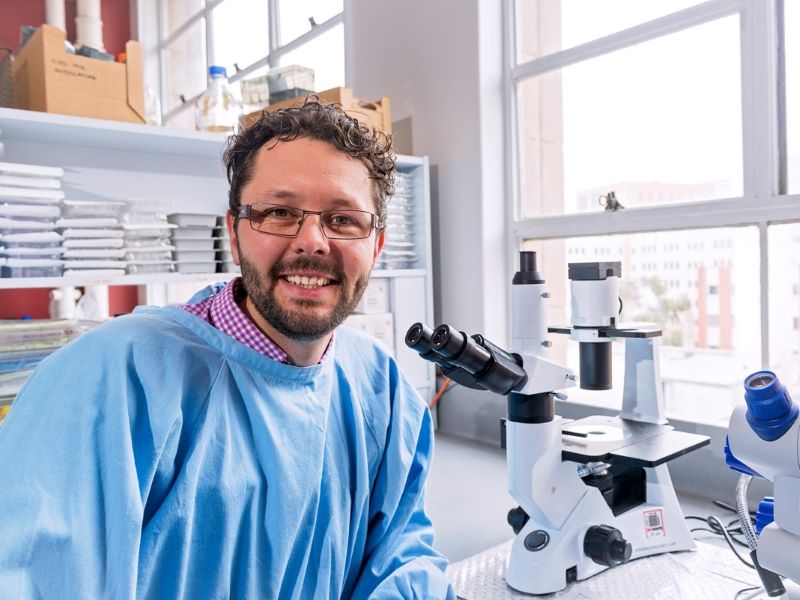The peak scientist group has appointed South Australian biomedicine researcher Professor Mark Hutchinson as its new president, replacing outgoing Professor Jeremy Brownlie.
The new president is a science entrepreneur and has flagged R&D spend and creating more “bench to boardroom scientists” as his priorities.
Professor Hutchinson is the Director of the ARC Centre of Excellence for Nanoscale Biophotonics at the University of Adelaide, and has a track record of industry partnerships and startup creation.
On Thursday he was announced as the new president of Science & Technology Australia (STA), the peak body representing 90,000 scientists and technologists.

Professor Hutchinson is credited with forging dozens of industry partnerships and creating 15 startup spin offs while leading the Adelaide-based Nanoscale Biophotonics ARC.
He said the translation focus needed to be applied widely across Australia but billions more in R&D funding will need to accompany it.
At 1.79 per cent of GDP, Australia’s investment in R&D has plummeted well behind global averages. The science group is pushing for a return to around three per cent, which would put Australia back among the top nations.
“A national R&D target of 3 per cent of GDP would make us more competitive with nations like the US, UK, Israel and China, which are heavily backing science and technology to drive their COVID recovery and grow their economies,” Professor Hutchinson told InnovationAus.
The sharp turnaround should start with a new $2.4 billion research translation and commercialisation fund, he said.
“That would be a powerful mechanism to drive more of the country’s world-leading research and turn it into the jobs, products, and services of the future,” Professor Hutchinson said.
“If we want to see fundamental science discoveries translated into economic returns we need to train a new generation of bench-to-boardroom scientists who have the skills and networks to realise the full impact of their innovation.”
Professor Hutchinson moves into the leadership role at a time when the research sector is under pressure from the government to produce more economic outcomes while also reeling from the impacts of the pandemic.
The federal government has unveiled plans to standardise IP agreements between universities and businesses and make them mandatory for publicly funded research – something the STA quickly opposed – and this week unveiled a new Trailblazer Universities program to set up commercialisation hubs.
“Australia can and must do more to commercialise world-leading research more consistently and at a far greater scale,” Professor Hutchinson said.
“But to get there will require strategic investment and developing the specialised skills to train more Australian researchers to be ‘bench-to-boardroom scientists’.”
“If we create a culture of closer engagement, greater sovereign capability, and even a handful of billion-dollar Australian grown and owned start-ups, we can powerfully shift the dial on research commercialisation.”
Professor Hutchinson said he is also concerned with the workplace issues within Australia’s STEM sector.
“We’re seeing rising levels of fatigue, a bleak drop in morale, and widespread job insecurity with job losses at universities and precarious short-term contracts,” he said.
“There’s a risk that many more of our brilliant scientists will hit breaking point and just walk away if we don’t fix this broken system of insecure work.”
“We need to realise as a nation that the brilliance of our science and technology capability has a human face. Fatigue and low morale are signs of hits to brain health. We need these brilliant brains – we must do more as a nation to support the people who have the capabilities to create the future solutions.”
The new president also paid tribute to his predecessor, Professor Jeremy Brownlie, who served on the board and executive of STA for more than a decade.
“Jeremy Brownlie has been an outstanding president for STA and a brilliant leader for Australia’s science and technology community,” he said.
Dr Brownlie, a senior science leader at Griffith University, said it had been a privilege to lead the science group as Australia responded to some of its biggest challenges in the pandemic and bushfires.
“I’m proud that STA is now truly the leading voice for the science and technology community, and an organisation with deep influence in the policy landscape,” he said.
“I am so pleased to see Mark step into the Presidency and know I’m leaving the organisation and sector in the hands of an outstanding leader.”
Do you know more? Contact James Riley via Email.

